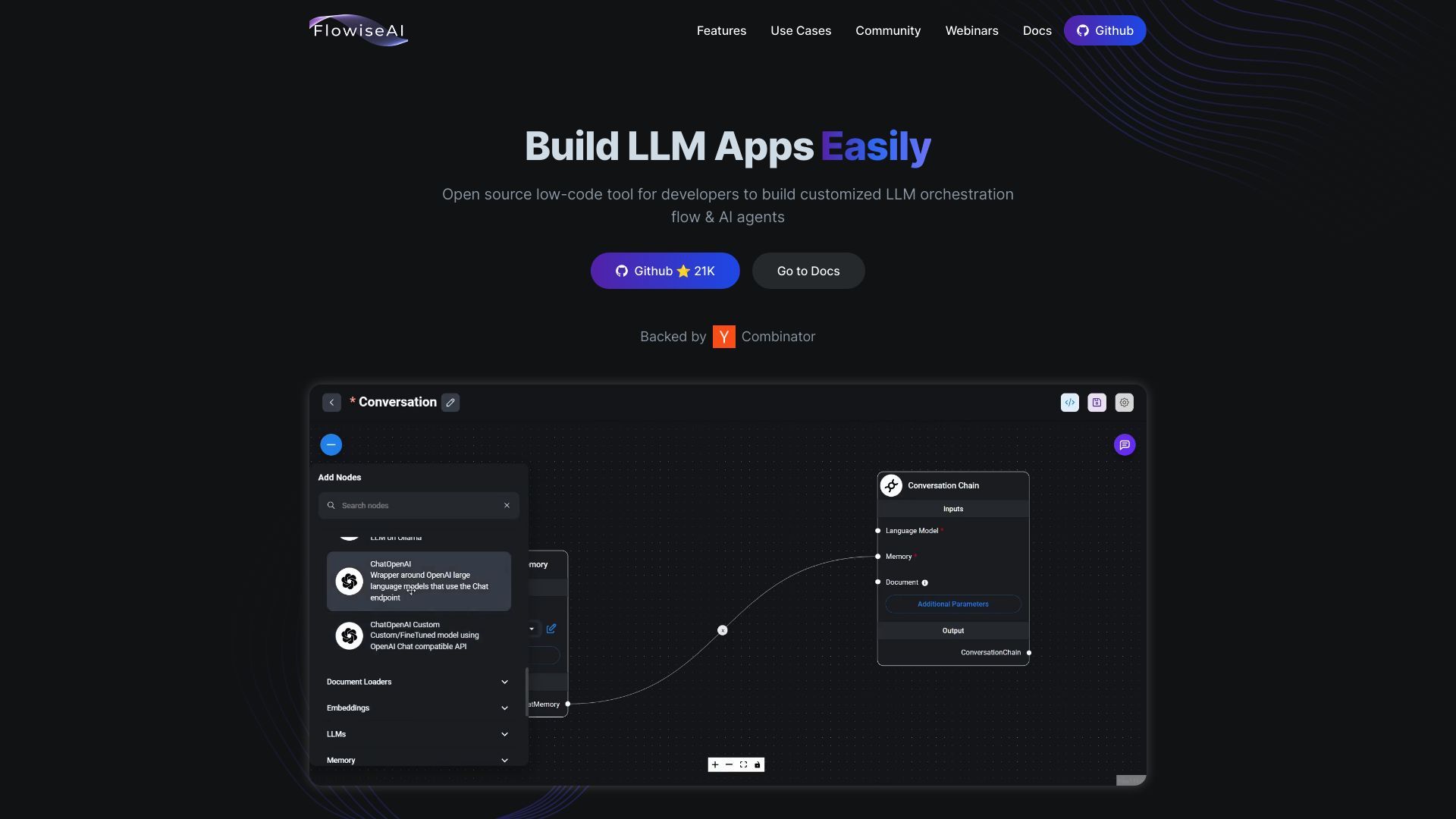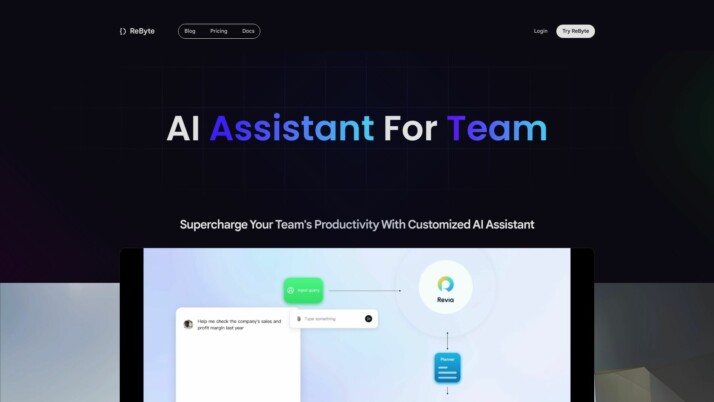FlowiseAI vs. Rebyte: Comparing AI Agent Development Platforms
AI agent development platforms FlowiseAI vs. Rebyte simplify building intelligent applications, each with distinct approaches. FlowiseAI’s low-code environment empowers developers to craft intricate AI workflows visually, while Rebyte’s no-code platform accelerates AI app creation for a broader audience. This comparison explores their unique features, integration capabilities, and deployment options to help you choose the right tool for your AI development needs. We’ll also introduce SmythOS, a comprehensive solution that combines powerful features with unmatched flexibility, revolutionizing how businesses harness AI technology.
FlowiseAI Overview
FlowiseAI empowers developers to create customized AI agents and large language model (LLM) orchestration flows using an intuitive, low-code approach. This open-source platform simplifies the process of building sophisticated AI applications without requiring deep expertise in artificial intelligence.
FlowiseAI’s visual interface enables rapid prototyping and deployment of AI workflows. Users can drag and drop various components like document loaders, text splitters, and LLMs to construct complex AI processes. This modular system allows for the creation of tailored solutions across diverse use cases, from document analysis to customer support chatbots.
FlowiseAI empowers developers to create customized AI agents and large language model (LLM) orchestration flows using an intuitive, low-code approach.


The platform shines in its integration capabilities. FlowiseAI supports various document types, connects with vector databases like Pinecone, and interfaces with multiple data sources including PDFs, web pages, and CSV files. This versatility makes it adaptable to a wide range of industry-specific needs.
While FlowiseAI offers powerful features for AI development, it may present a learning curve for non-technical users. The platform’s open-source nature provides flexibility but could require more setup and maintenance compared to fully managed solutions. Additionally, while it supports various LLMs, it may not offer the same level of pre-built, industry-specific solutions as some enterprise-focused platforms.
FlowiseAI’s commitment to democratizing AI development positions it as a valuable tool for organizations looking to leverage AI without extensive resources. Its open-source model and focus on customization make it particularly appealing for developers and companies seeking to build unique AI solutions tailored to their specific requirements.
Rebyte Overview
Rebyte empowers users to rapidly create AI-powered applications without extensive coding skills. The platform’s visual agent builder enables the construction of complex AI workflows using large language models, allowing even non-technical users to develop sophisticated backend logic.
Rebyte’s no-code approach extends to UI creation, letting users design fully customized interfaces for their AI agents. The platform facilitates connections to private data sources, ensuring that agents can leverage proprietary information effectively. Rebyte also provides detailed observability into every step of an agent’s operation, enhancing transparency and debugging capabilities.


Screenshot of Rebyte Website
Rebyte empowers users to rapidly create AI-powered applications without extensive coding skills. The platform’s visual agent builder enables the construction of complex AI workflows using large language models…
A standout feature of Rebyte is its serverless runtime, engineered for seamless production deployment and scaling of AI agents. This infrastructure allows businesses to focus on agent development rather than operational concerns. The platform’s emphasis on end-user programming through AI aligns with its vision to democratize AI tool development, enabling knowledge workers and teams to automate workflows and boost productivity without writing code.
Rebyte’s comprehensive lifecycle management for AI applications sets it apart from competitors. From ideation to deployment, the platform streamlines the entire process, minimizing the need for manual coding. This approach positions Rebyte as a catalyst for the GenAI era, where transforming ideas into deployed applications becomes accessible to a broader audience.
While Rebyte offers powerful capabilities, users should consider their specific needs when evaluating the platform. The focus on visual development and no-code solutions may limit customization options for highly specialized use cases requiring low-level programming. Additionally, as with any cloud-based solution, users must carefully assess data privacy and security implications, especially when dealing with sensitive information.
Feature Comparison
FlowiseAI and Rebyte offer powerful capabilities for building AI agents, but key differences set them apart. FlowiseAI focuses on providing a visual, low-code environment for constructing AI workflows. Its drag-and-drop interface allows users to connect various components like document loaders, text splitters, and language models to create complex AI processes. This approach makes AI development more accessible to users without deep programming expertise.
Rebyte, on the other hand, emphasizes rapid application development with a no-code approach. It provides a visual agent builder for creating customizable AI agents and allows users to design fully customized user interfaces without writing code. Rebyte’s serverless runtime is engineered for seamless production deployment and scaling, addressing operational concerns that FlowiseAI may require more manual configuration to handle.
In terms of core components, FlowiseAI offers robust integration with various document types and vector databases, making it well-suited for document analysis and retrieval tasks. Rebyte focuses more on end-user programming through AI, aiming to empower knowledge workers to automate workflows without coding. This difference in focus may impact the depth of customization available in each platform for specific use cases.
Security features also differ between the two. While both platforms likely offer basic security measures, Rebyte’s emphasis on production deployment suggests it may have more advanced features for data privacy and secure scaling. FlowiseAI, being open-source, may require additional configuration or third-party tools to achieve the same level of enterprise-grade security.
Ultimately, the choice between FlowiseAI and Rebyte depends on specific project requirements. FlowiseAI offers more granular control over AI workflows, beneficial for users who need to fine-tune their AI processes. Rebyte provides a more streamlined path from idea to deployed application, catering to users who prioritize speed and ease of use in bringing AI solutions to production.
Feature Comparison Table
| FlowiseAI | Rebyte | SmythOS | |
|---|---|---|---|
| CORE FEATURES | |||
| Hosted Agents (Dev, Production) | ❌ | ✅ | ✅ |
| Environments (Dev, Production) | ❌ | ✅ | ✅ |
| Autonomous Agents | ✅ | ❌ | ✅ |
| Debug Tools | ❌ | ✅ | ✅ |
| Multimodal | ✅ | ❌ | ✅ |
| Multi-Agent Collaboration | ❌ | ❌ | ✅ |
| Audit Logs for Analytics | ❌ | ✅ | ✅ |
| Work as Team | ❌ | ✅ | ✅ |
| SECURITY | |||
| Constrained Alignment | ❌ | ❌ | ✅ |
| Data Encryption | ✅ | ❌ | ✅ |
| OAuth | ❌ | ❌ | ✅ |
| IP Control | ❌ | ❌ | ✅ |
| COMPONENTS | |||
| Huggingface AIs | ✅ | ❌ | ✅ |
| Zapier APIs | ❌ | ✅ | ✅ |
| Classifiers | ❌ | ❌ | ✅ |
| Logic | ✅ | ❌ | ✅ |
| Data Lakes | ❌ | ❌ | ✅ |
| DEPLOYMENT OPTIONS (EMBODIMENTS) | |||
| Deploy as Webhook | ✅ | ❌ | ✅ |
| Staging Domains | ❌ | ❌ | ✅ |
| Production Domains | ❌ | ❌ | ✅ |
| API Authentication (OAuth + Key) | ✅ | ❌ | ✅ |
| Deploy as Scheduled Agent | ❌ | ❌ | ✅ |
| DATA LAKE SUPPORT | |||
| Hosted Vector Database | ❌ | ✅ | ✅ |
| Sitemap Crawler | ❌ | ❌ | ✅ |
| YouTube Transcript Crawler | ❌ | ❌ | ✅ |
| URL Crawler | ✅ | ❌ | ✅ |
| Word File Support | ❌ | ✅ | ✅ |
Best Alternative to FlowiseAI and Rebyte
SmythOS emerges as the superior alternative to FlowiseAI and Rebyte, offering a comprehensive platform for AI agent development and deployment. Our solution combines ease of use with an extensive feature set, empowering users to create sophisticated AI agents for unlimited use cases.
We designed SmythOS with a powerful drag-and-drop interface, enabling rapid development of complex AI workflows without extensive coding knowledge. This visual approach surpasses both FlowiseAI’s low-code environment and Rebyte’s no-code tools, striking an optimal balance between accessibility and customization.
SmythOS excels in its breadth of capabilities…providing a versatile platform supporting multimodal interactions, autonomous agents, and multi-agent collaboration.
SmythOS excels in its breadth of capabilities. While FlowiseAI focuses on document analysis and Rebyte emphasizes end-user programming, we provide a versatile platform supporting multimodal interactions, autonomous agents, and multi-agent collaboration. This flexibility allows users to tackle a wider range of challenges, from customer service chatbots to complex data analysis tasks.
Security and scalability set SmythOS apart. We offer robust features like data encryption, OAuth integration, and IP control, addressing enterprise-grade security needs that FlowiseAI and Rebyte may struggle to match. Our platform also provides seamless scalability, supporting everything from small-scale prototypes to large-scale production deployments across multiple environments.
Integration capabilities further distinguish SmythOS. We support a vast ecosystem of AI models, APIs, and tools, including Hugging Face models, Zapier integrations, and custom API connections. This extensive integration support, combined with our advanced deployment options and data handling capabilities, positions SmythOS as the most versatile and powerful choice for organizations seeking to harness the full potential of AI agents.
Conclusion
FlowiseAI and Rebyte offer powerful tools for building AI agents, each with unique strengths. FlowiseAI excels in providing a visual, low-code environment for constructing AI workflows, making it accessible to users with limited programming expertise. Rebyte, on the other hand, focuses on rapid application development with a no-code approach and seamless production deployment.
While both platforms have their merits, SmythOS emerges as the superior choice for businesses and developers seeking a comprehensive AI agent development solution. SmythOS combines the best of both worlds, offering an intuitive drag-and-drop interface for easy agent creation and a robust set of features for advanced customization and deployment.
SmythOS stands out with its extensive integration ecosystem, supporting over 300,000 integrations and a wide range of AI models from various providers. This flexibility allows users to create sophisticated AI workflows that seamlessly connect with existing tools and data sources. Furthermore, SmythOS’s ’Create Once, Deploy Anywhere’ approach enables users to build agents that can be easily integrated into multiple environments, from chatbots to APIs and scheduled tasks.
We invite you to experience the power of SmythOS for yourself. Create a free SmythOS account today and start building AI agents with unparalleled ease and flexibility. With our 30-day money-back guarantee and generous free plan, you can explore the future of AI workforce automation risk-free. Discover our diverse range of AI-powered agent templates to jumpstart your projects and revolutionize your workflow with intelligent agents.
Last updated:
Disclaimer: The information presented in this article is for general informational purposes only and is provided as is. While we strive to keep the content up-to-date and accurate, we make no representations or warranties of any kind, express or implied, about the completeness, accuracy, reliability, suitability, or availability of the information contained in this article.
Any reliance you place on such information is strictly at your own risk. We reserve the right to make additions, deletions, or modifications to the contents of this article at any time without prior notice.
In no event will we be liable for any loss or damage including without limitation, indirect or consequential loss or damage, or any loss or damage whatsoever arising from loss of data, profits, or any other loss not specified herein arising out of, or in connection with, the use of this article.
Despite our best efforts, this article may contain oversights, errors, or omissions. If you notice any inaccuracies or have concerns about the content, please report them through our content feedback form. Your input helps us maintain the quality and reliability of our information.
